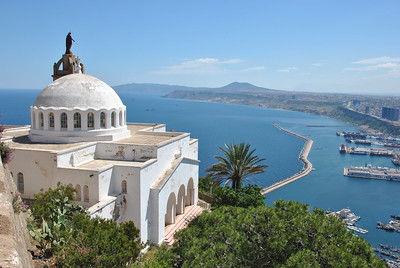Jubilee Campaign has already released numerous news articles regarding the Algerian government’s abrupt and forced closure of protestant churches across the nation. Most recently, earlier in June we reported on the closure of three churches in a single day and in a single area. In fact, Jubilee Campaign has publicized our 12-page Rejoinder from Jubilee Campaign to “Response of the Government of Algeria to allegations concerning the closure of Protestant churches and places of worship”, in which we outline the numerous ways in which the registration, administration, and closure of houses of worship is carried out discriminatorily against Protestant communities, and increasingly so during the pandemic.
Though much of our advocacy on Algeria has recently been about pushing for answers from the Algerian government on the closure of churches, and of course the hope that these churches will be rightfully reopened and available to worshippers, the persecution does not end there. It is therefore past time that we talk about Algeria’s blasphemy law.
Article 144 of the Algerian Penal Code stipulates that “any individual who insults the prophet and the messengers of God, or denigrates the creed or prophets of Islam through writing, drawing, declaration, or any other means, will receive three to five years in prison, and/or be subject to a fine of between 50,000 and 100,000 Algerian dinars” [approximately USD $373 – $746]. Moreover, the penal code further criminalizes acts of peaceful proselytism and evangelism, thus further encroaching on an individual’s right to change religions according to their own convictions.
Algeria’s blasphemy law has come under increasing scrutiny in recent months as we have seen more and more citizens being arbitrarily detained and punished for acts which fall under the problematic legislation.
In April 2020, Algerian political activist Walid Kechida was arrested for his promotion of democratic reform and notably for his leadership of a Facebook page that shares satirical memes regarding the Algerian government. Nearly a year after his initial arrest, and after spending months in detention, Kechida was officially sentenced in January 2021 to three years imprisonment under Article 144 of the penal code for insulting the divine entity. End Blasphemy Law Coalition Coordinator Emma Wadsworth-Jones stated regarding Kechida’s case: “evidence shows us that blasphemy laws are often used as a pretext to silence public intellectuals and political dissidents, preventing them from peacefully expressing their opinions [….] We urge the Algerian authorities to overturn Walid Kechida’s conviction for blasphemy and repeal its existing blasphemy laws.”
In February 2021, 43-year-old Algerian Christian Hamid Soudad was abruptly arrested for a Facebook post depicting a cartoon of Muhammad that he had shared back in 2018; though Soudad was briefly released after interrogation and permitted to return home, he was quickly summoned back to the detention center. The following morning, Soudad was officially sentenced to five years in prison for insulting the prophet Muhammad and violating Article 144 of the penal code; his appeal was definitively rejected and his sentence upheld on 22 March 2021. Soudad’s lawyer, Farid Khemisti, has expressed that he believes the maximum sentence was chosen because Soudad is a Christian, and because one of his former coworkers – an Islamic extremist – had filed complaints about Soudad in the past.
In mid-April 2021, Algerian Islamic expert Said Djabelkheir was sentenced to three years in prison for a variety of Facebook posts he made in January 2020 in which he compared Eid al-Adha and Berber New Year and in which he called referred to some texts in the Qur’an as myths; Djabelkheir was charged under Algerian penal code article 144 for “offending the Prophet of Islam” and “denigrating the dogma or precepts of Islam”. Amnesty International’s Deputy Director for the Middle East and North Africa, Amna Guellalì, discussed the case, stating: “it is outrageous that Said Djabelkheir is facing three years in prison for simply voicing his opinions about religious texts. Punishing someone for their analysis of religious doctrines is a flagrant violation of the rights to freedom of expression and freedom of belief – even if the comments are deemed offensive by others.”
In June 2021, Algerian authorities shuttered Oran city’s Oratoire Church and a local Christian bookstore, both of which were owned and managed by Pastor Rachid Seighir. Less than a week following the closures, Pastor Seighir and bookstore salesman Nouh Hamini were arrested, swiftly charged with “distributing publications or any other propaganda undermining the faith of a Muslim”, and sentenced to two years in prison each accompanied by a fine of 500,000 dinars [approximately USD $3,732]. On appeal, Seighir and Hamini were granted a suspended sentence of one year in prison each and a fine of 200,000 dinars [approximately USD $1,493]. It is believed, however, that the recent charges leveraged against Pastor Seighir were an act of retaliation for a situation in which he faced similar charges and was acquitted in 2008.
On 23 June 2021, the United States Commission on International Religious Freedom released a statement expressing its concerns regarding the shrinking of religious freedom in Algeria:
“Recent decisions by Algerian courts to sentence Christians accused of blasphemy and proselytizing to multi-year prison sentences and to seal protestant churches that have been forcibly closed demonstrates the country is headed in the wrong direction.” – USCIRF Chair Nadine Maenza
“These court decisions are blatant attempts to deny Algerian Christians their right to freedom of religion and belief. We encourage U.S. government officials to attend the appeals for these rulings to demonstrate our firm commitment to religious freedom for Christians and all religious minorities in Algeria” – USCIRF Commissioner Frederick A. Davie
Cover image by Maina Marjany on Flickr (CC BY-SA 2.0)

